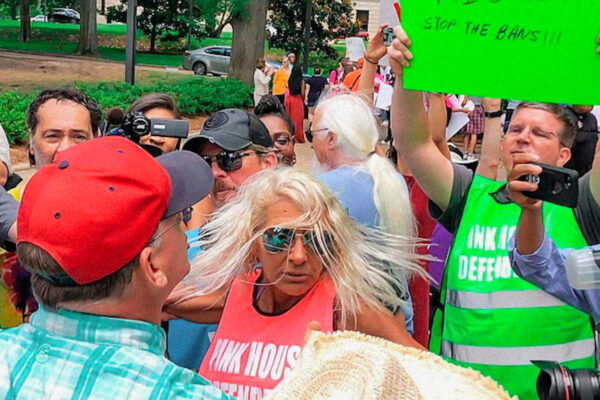Ashton Pittman |Mississippi Free Press| May 17, 2021
The U.S. Supreme Court announced this morning that it will hear a Mississippi case challenging Roe v. Wade in defense of the state’s 15-week abortion, “The Gestational Age Act.”
Anti-abortion activists and leaders hope that the case will result in a reversal of Roe, the landmark 1973 precedent that ended blanket abortion bans in states nationwide.
The case, Dobbs v. Jackson Women’s Health Organization, will be the first major challenge to abortion rights since ex-President Trump replaced Justices Anthony Kennedy and Ruth Bader Ginsburg, who each voted to uphold Roe v. Wade in the past, with the more conservative Justices Brett Kavanaugh and Amy Coney Barrett.
‘An Alarming and Disturbing Day’
Gov. Tate Reeves, who led the Mississippi Senate when it passed the 15-week ban, celebrated the news this morning.
“The sanctity of life. The future of our children. Mississippi is at the forefront of protecting both. And that is what is at stake in the case we have been praying the U.S. Supreme Court would decide to hear,” the Republican governor tweeted. “Thanks to millions of voters in 2016, President Donald Trump appointed three new Supreme Court Justices.”
Earlier this month, Reeves and other state leaders appeared at “National Day of Prayer” event held by an evangelical organization that espouses Christian dominionist views. The event included a speaker who prayed for God to put an end to abortion.
Julie Burkhart, the founder and CEO of Trust Women, said in a statement this morning that the Supreme Court’s decision to take the case is a threat to women’s rights.
“Today’s decision by the Supreme Court to hear a direct challenge to Roe is an alarming and disturbing day for reproductive rights and justice in the United States. … Today is the loudest wake up call yet. People in America are under attack and personal health decision-making about their own bodies stands on the precipice of being lost.”
‘Testing the Limits of Roe’
U.S. District Court Judge Carlton W. Reeves, an Obama appointee to the U.S. District Court for the Southern District of Mississippi in Jackson, blocked the 15-week ban from taking effect in 2018, saying the Mississippi Legislature passed “a law it knew was unconstitutional” under the Roe v. Wade precedent. But he acknowledged that backers of the law may have felt emboldened by Kavanaugh’s confirmation weeks prior to the ruling.
“With the recent changes in the membership of the Supreme Court, it may be that the state believes divine providence covered the Capitol when it passed this legislation,” Reeves wrote. “Time will tell. If overturning Roe is the state’s desired result, the state will have to seek that relief from a higher court. For now, the United States Supreme Court has spoken.”
The state appealed Judge Reeves’ ruling to the 5th U.S. Circuit Court of Appeals in New Orleans, which also found the law unconstitutional.
But in court filings last year, Mississippi Attorney General Lynn Fitch asked the nation’s high court to revisit and overturn one of Roe v. Wade’s key holdings: that “a State may not prohibit any woman from making the ultimate decision to terminate her pregnancy before (fetal) viability.”
The lower courts ruled that the Mississippi law banning abortions at 15 weeks, known as “The Gestational Age Act,” was unconstitional for that reason; medical science says fetuses generally become viable outside the womb at around 24 weeks.
“This Court should grant the petition, hold that it is illogical to impose a ‘rigid line allowing state regulation after viability but prohibiting it before viability’” and “uphold the Gestational Age Act,” Attorney General Lynn Fitch wrote in a filing with the U.S. Supreme Court last summer.
The current case, Fitch wrote in a Supreme Court filing, is “an ideal vehicle to promptly resolve” questions about Roe v. Wade and the Supreme Court’s position on abortion rights. Today, she reiterated her commitment to defending the law.
“As Mississippi’s chief legal officer, I am committed to preserving the rule of law, including defending the constitutionality of this statute,” Fitch said in a statement this morning. “The Mississippi Legislature enacted this law consistent with the will of its constituents to promote women’s health and preserve the dignity and sanctity of life. I remain committed to advocating for women and defending Mississippi’s legal right to protect the unborn.”
In 2019, Mississippi State Sen. Joey Fillingane, a Sumrall Republican who was among the 15-week ban’s sponsors, told this reporter in a story for another publication that Trump’s 2018 appointment of Kavanaugh meant that “now would be a good time to start testing the limits of Roe.” That was before the U.S. Senate confirmed Barrett just days before the 2020 election.
This afternoon, the ACLU of Mississippi statement released a statement with its executive director, Jarvis Dortch, warning that “if Mississippi politicians succeed at the Supreme Court, it will trigger an outright abortion ban in our state.”
“Lawmakers that supported this ban should be up-front and honest about their goal. The 15-week and 6-week abortion bans were political vehicles to get the Supreme Court to completely take away a person’s right to make decisions about their own body,” Dortch said. “It’s disingenuous to claim that lawmakers were considering the health and well-being of patients when they considered these laws.
“Legislators held zero public hearings and heard from zero healthcare experts about these bans, because restricting a person’s healthcare and rights was a political decision. The Mississippi Legislature and Gov. Reeves continue to believe they can make personal decisions on the behalf of all Mississippians.”

